No deal Brexitpublished at 14:36 GMT 9 January 2019
SNP MSP Sandra White queries the impact of a no deal Brexit on Scotland's economy.
The local government committee takes evidence on the budget from local authorities and Derek Mackay
Finance, economy and fair work ministers face portfolio questions
A ministerial statement on animal welfare is made
MSPs debate the life sciences sector
An SNP MSP celebrates a PC recycling project
Craig Hutchison and Louise Wilson
SNP MSP Sandra White queries the impact of a no deal Brexit on Scotland's economy.
Allow X content?
This article contains content provided by X. We ask for your permission before anything is loaded, as they may be using cookies and other technologies. You may want to read X’s cookie policy, external and privacy policy, external before accepting. To view this content choose ‘accept and continue’.
Allow X content?
This article contains content provided by X. We ask for your permission before anything is loaded, as they may be using cookies and other technologies. You may want to read X’s cookie policy, external and privacy policy, external before accepting. To view this content choose ‘accept and continue’.
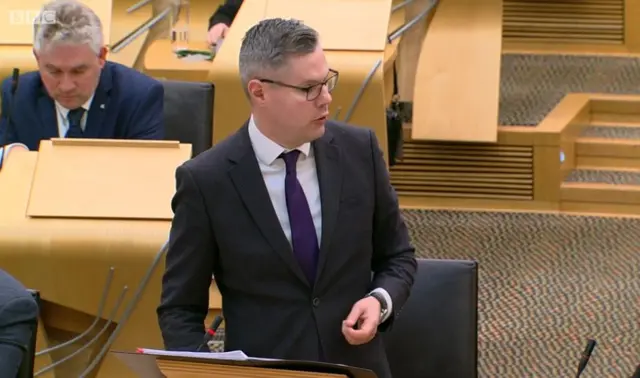
Finance Secretary Derek Mackay
Finance Secretary Derek Mackay says economic growth per person will be the same in Scotland as the rest of the UK, but overall growth will be slower.
He attributes this to lower levels of migration to Scotland.
Labour MSP Rhoda Grant says there is much indigenous talent in Scotland and asks about what will done to support SMEs to grow this talent.
Mr Mackay says the government is making an effort to upskill and reskill people.
Tory MSP Liam Kerr asks how the Scottish Fiscal Commission’s forecast for economic growth in Scotland over the next four years compares with that for the UK as a whole.
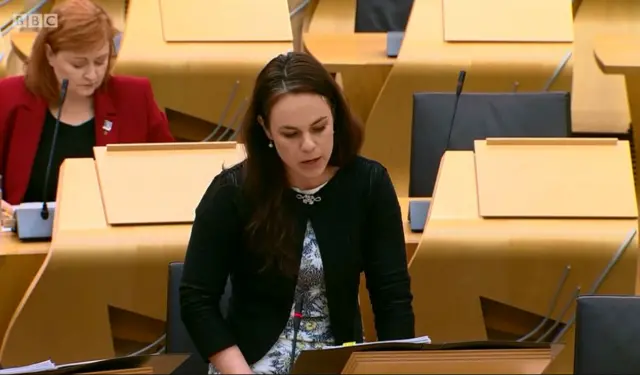 Image source, bbc
Image source, bbcPublic Finance Minister Kate Forbes
Public Finance Minister Kate Forbes replies that the Scottish government has no plans to conduct a review into the single-pesron discount for council tax.
Labour MSP Jackie Baille moves to the single-person water discount and calls for its cessation to be ruled out.
The minister says in relation to water charges there has been a consultation on ending the single-person water discount and says there will be further research into this.
Tory MSP Alexander Stewart asks the Scottish government what plans it has to review the single-person discount for council tax.
 Image source, PA
Image source, PAMSPs now have the opportunity to quiz finance, economy and fair work ministers.
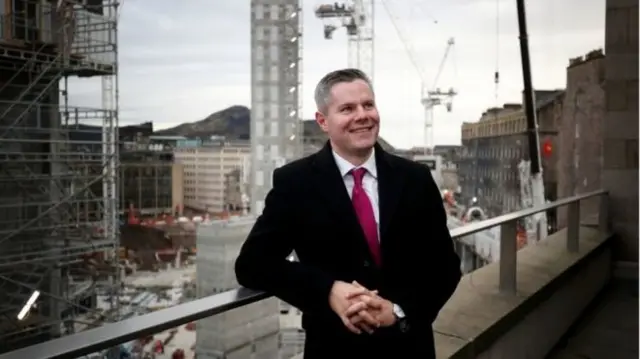 Image source, PA
Image source, PAFinance Secretary Derek Mackay faces more questions from MSPs, this time in the chamber.
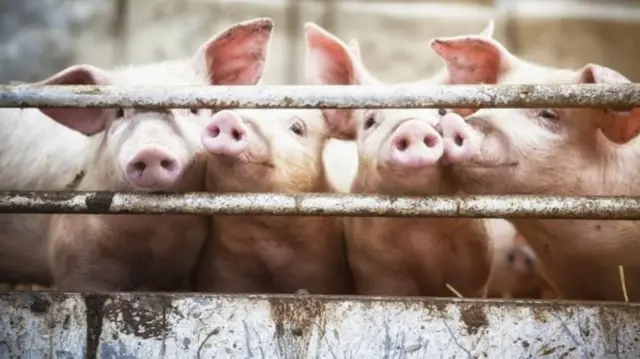 Image source, Getty Images
Image source, Getty ImagesAfter portfolio questions, the government will make a statement on improving animal welfare.
Then it will then lead a debate recognising the life sciences sector.
SNP MSP Gordon MacDonald will then celebrate the Rotary Club of Currie Balerno’s recycling of PCs.
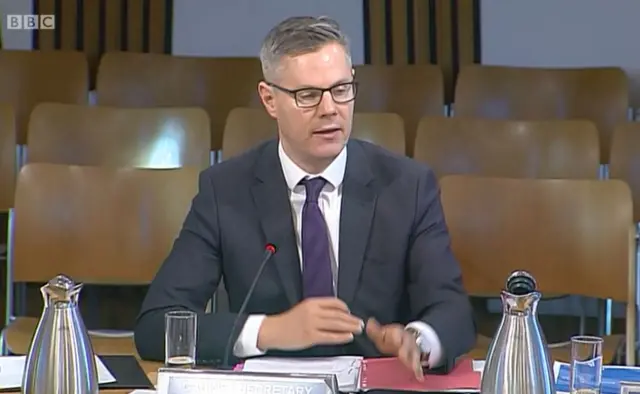 Image source, bbc
Image source, bbcLabour MSP Alex Rowley asks if there is more money on the table for budget negotiations, as there has been in previous years.
Mr Mackay says his door is open to serious ideas and credible plans to amend the budget.
The finance secretary insists: "I am open to that engagement."
However in terms of fiscal flexibility he is very limited, he says and he stresses the risk of the budget going down.
The minister wonders if it is opposition parties' constitutional obsession that is making them not take this seriously and threatening the extra £2bn in expenditure in his budget plans.
"People shouldn't play games with this budget."
The committee draws to a close.
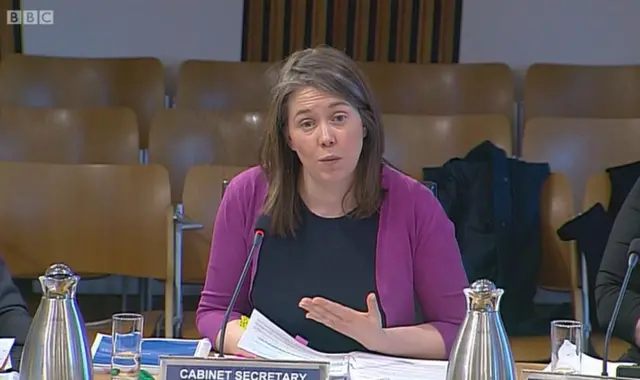
Tory MSP Graham Simpson asks about housing adaptations, saying demand is outstripping to money available and stating there is a growing funding gap.
Ms Campbell accepts there is much more work to do and points to ongoing pilots in how to make better use of funding.
We need to make sure we maximise the £10m set out for adaptations she says.
The communities secretary also highlights others pots of funding available for this purpose, including the Transfer of Management of Development Funding.
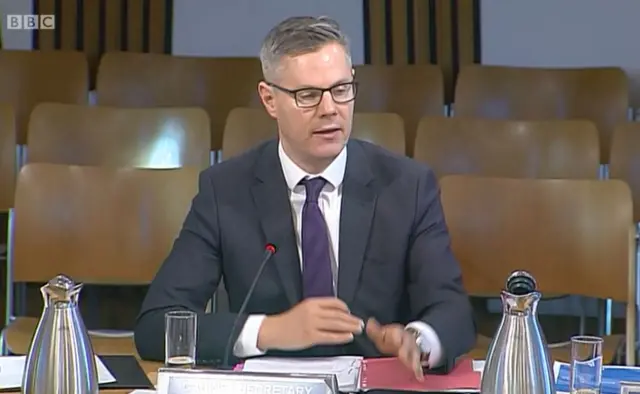 Image source, bbc
Image source, bbcTorty MSP Alexander Stewart points out some councils are increasing their charges for burial by 20% and a number of councils are using their reserves to balance their books.
Mr Stewart asks for the cabinet secretary's reaction to the fact that councils are having to consult on which servcies should be cut.
How does a half billion pound tax cut to the richest in society help that situation, hits back Mr Mackay.
The finance secretary reiterates that local authorities have to make choices.
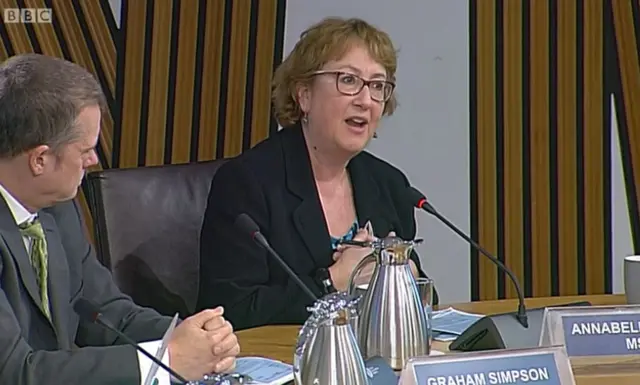
SNP MSP Annabelle Ewing
SNP MSP Annabelle Ewing asks about the reserves the Scottish government holds.
Mr Mackay says the most recent figure was £192m.
He also says local authority reserves, as reported in 2017, totaled £1,178m.
Local government has been a beneficiary of underspend being carried forward he adds.
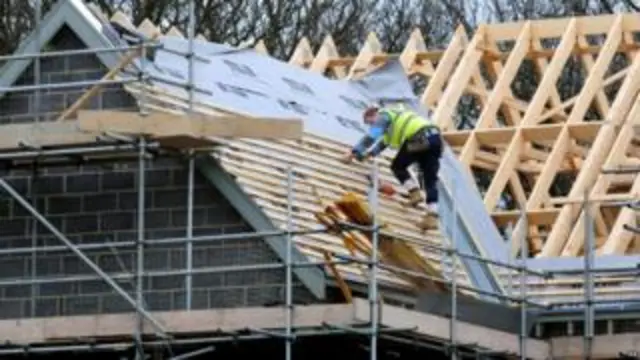 Image source, PA
Image source, PAGreen MSP Andy Wightman says SPICe argue that only 58,427 affordable houses have been built, not the 80,000 that Mr Mackay said had been built.
He argues the difference has been made up by bringing affordable house "off the shelf" from existing stock.
Mr Mackay clarifies saying there has been 80,000 affordable homes delivered.
Ms Campbell insists the Scottish government is delivering affordable houses for the people of Scotland and it expects to meet the target of 50,000 affordable homes being delivered.
Mr Wightman points out that the SNP manifesto commitment was to build, not deliver, 50,000 affordable homes.
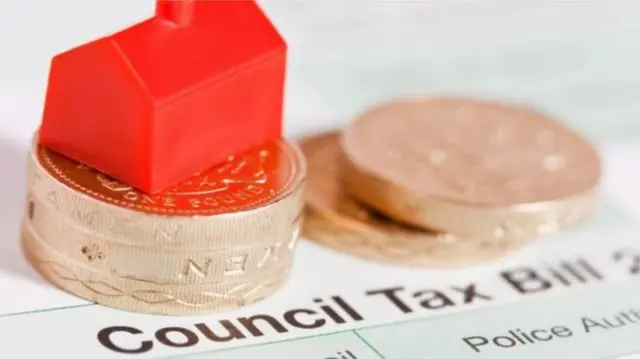 Image source, Getty Images
Image source, Getty ImagesCouncils are demanding increased powers on tax from the Scottish government in a bid to get "the old, powerful local government back".
The local authority body Cosla says there needs to be "a more sophisticated debate about sustainable funding".
That must include councils having "the right financial levers", according to Cosla president Alison Evison.
The government said it wants to "devolve more power to give communities a greater say about public services".
Allow X content?
This article contains content provided by X. We ask for your permission before anything is loaded, as they may be using cookies and other technologies. You may want to read X’s cookie policy, external and privacy policy, external before accepting. To view this content choose ‘accept and continue’.
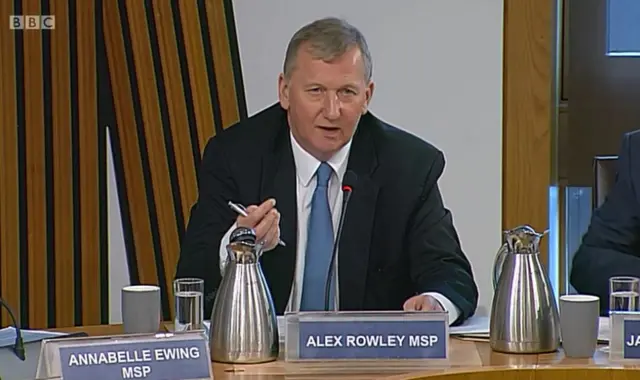 Image source, bbc
Image source, bbcLabour MSP Alex Rowley
Labour MSP Alex Rowley says IJBs, social work and education equals around 70% of budgets, so councils are having to ask if they should stop cutting the grass or stop street cleaning.
Mr Rowley points out COSLA argues it has had to face a 7% cut over the last 10 years compared to less than 1% in the Scottish government budget.
The impact on frontline teaching is "horrific", the Labour MSP says.
Mr Mackay again insists that he has provided a real terms increase to local government since he has been finance secretary.
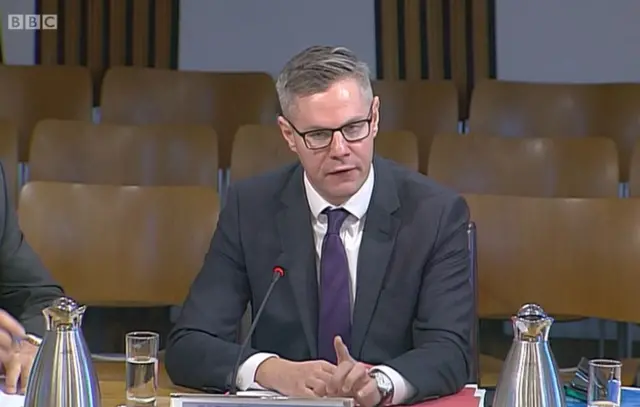
Regarding the roads budget example, Mr Mackay highlights the capital budget has been increased so arguably this means more for roads.
If the budget is not approved, this means less money for the local government, he adds.
Tory MSP Graham Simpson notes that overall the budget has gone up but due to ringfencing, there is less for some areas.
Mr Mackay says it is inaccurate to say the majority of council budgets are ringfenced.
He says the Scottish government has reduced ringfencing, adding there is a difference between statutory requirements and ringfenced funding.
Tory MSP Graham Simpson says when you strip away ringfenced money there is real terms cut of £319m meaning all councils have to make cuts.
Mr Mackay accepts if he is forced to accept discounts there is less money, but in reality there is more money in the settlement going to local government.
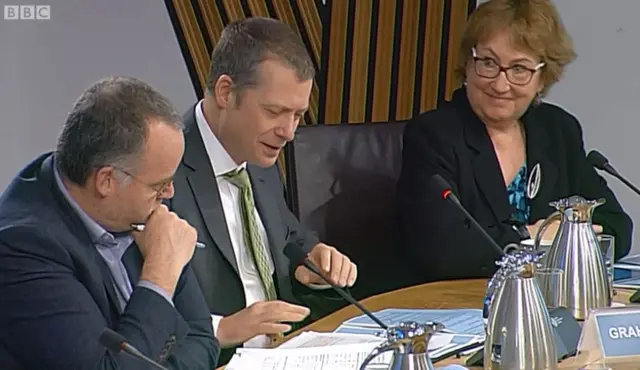 Image source, bbc
Image source, bbcTory MSP Graham Simpson
I don't accept the argument that I should discount resources just because someone else wants to present it in a different way, Mr Mackay argues.
"This proposes more money for local government in cash terms or real terms."
Will all councils have to make cuts re-asks Mr Simpson.
"Of course local authorities will have choices to make," replies Mr Mackay.
The Scottish government is making choices to invest in public services which means real terms growth in, for example, education Mr Mackay states.
We are trying to provide stability and sustainability for public services, he insists.
The finance secretary says the share of spend to local government is about the same as the previous year at 27%.